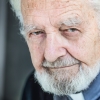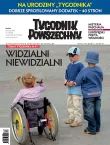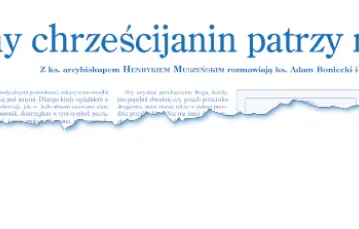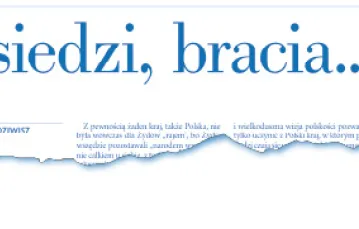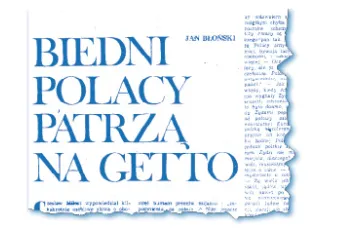Wykupienie dostępu pozwoli Ci czytać artykuły wysokiej jakości i wspierać niezależne dziennikarstwo w wymagających dla wydawców czasach. Rośnij z nami! Pełna oferta →
Father Adam Boniecki’s text appeard in "Tygodnik Powszechny" 29/01
Rabbi Baker (who was once called Jakub Piekarz) is old and walks with difficulty; his kind face is white as paper. But now, when he speaks - for a long time, without any notes, set against the grey sky - he exudes strength. Rabbi Baker says we must learn to love our neighbour, and Jedwabne will be a starting point in this learning. “Amen," he concludes. Let us hope it is so.
Yesterday, the descendants of Jews who had lived in Jedwabne spoke at the Ministry of Foreign Affairs in Warsaw. At the government’s invitation, they arrived from the US, Israel, Mexico, and Argentina. After the meeting with the minister, they held a press conference. They chose from amongst themselves a few people who spoke on behalf of everyone. The son-in-law of Rabbi Baker (who was too tired to attend), also a rabbi, spoke thus about Poland, “There would be no Jewish history without Poland, because for over a thousand years Jews were part of Polish history. Our greatest rabbis, wise men, and our entire culture originated here." He continued, “Jedwabne is the fruit of the hate sown by the Germans. This is not the history of Poland - it was not you who sowed the hate, it was the Nazis."
Yet, a different tone prevailed. Other victims’ relatives said, “We have not come to Poland to seek revenge or, as some think, to seek compensation, but to mourn our ancestors and say Kaddish for them." They said, “We do not need this ceremony or public grief. We are here to say that Poles do not care about the victims. They should keep their shame and grief to themselves."
They said, “May the Almighty Yahweh cause the truth to be seen and a temple to be built (at Jedwabne) so that the souls of the murdered can find peace there."
They said, “We have come here despite unpleasant experiences such as the exhumation and the first version of the inscription on the monument, which was offensive to Jews. It is good that the inscription has been changed, but the new one does not reflect the whole truth either. >
> We will accept it when it reveals the truth." They also mentioned the many Poles who had saved Jews at Jedwabne, adding that they did not want to reveal their names as it might put those people at risk; they hoped for a Poland where a mother could, without fear, tell her child that he is Jewish.
There was tiredness in their voice, but not anger. They are the second generation of Holocaust survivors. They recount what their parents and relatives remembered from 10 July 1941 and then told them. What they remembered was terror, death, screams from the barn, and the suffocating smell of smoke; they remembered that the murderers were Poles. They also remembered that they owed their survival to Poles and that this brought danger on their rescuers. This is the Jewish story of Jedwabne that their collective memory holds. Our collective memory holds those who saved them, risking their own lives.
This is why they say, “We are not satisfied with the inscription on the monument; we want it to tell the whole truth." The inscription reads, “In memory of the Jews of Jedwabne and surrounding areas, men, women, and children, fellow-dwellers of this land, murdered and burned alive at this site on 10 July 1941. Jedwabne, 10 July 2001." The inscription is in Polish, Hebrew, and Yiddish. Above it is a Hebrew prayer, “El maleh rahamim! O merciful God, grant a deserved rest on the wings of your presence to the souls of those murdered at Jedwabne that departed for their own world. Let them find rest in the garden of Eden." When the Institute of National Remembrance completes its investigation, the inscription will perhaps be changed.
The investigation is currently under way. However, “We know much about this crime, though still not everything... We know enough to be able to stand here in truth - facing the pain, cries and suffering of those who were murdered here, before the victims’ families who are present here today. The criminals had a sense of impunity, since the German occupiers incited them to those acts. We know for certain that Poles were among the persecutors and murderers. We cannot have any doubt... People did this to people, neighbours to neighbours" - said Aleksander Kwaśniewski.
The President weighs every word. As a citizen and President, he apologises “in my own name and in the name of those Poles whose conscience is moved by that crime." He begs the ghosts of the dead and their families for forgiveness. And he concludes by referring to the Polish bishops’ prayer in Warsaw on 27 May, “Let all those who harbour resentment and rancour towards the Jewish people accept the grace of a change of heart... Let that change take place!." And he assures everyone present: “We speak words of regret and bitterness...not because the world is listening" - but because “we need them most ourselves ...to turn evil into goodness."
The platform is surrounded by barriers and a police cordon. Those inhabitants of Jedwabne who wanted to come closer were prevented from doing so. Later, some of them entered the area; the rest, discouraged, went home. Once the Chopin funeral march had finished, those present were welcomed by Mayor Krzysztof Godlewski. After the President, Israel’s Ambassador to Poland, Shevach Weiss, spoke, “I, Professor Shevach Weiss, Israel’s Ambassador to Poland, had the opportunity to meet other neighbours as well. Thanks to those people, my family and I survived the Holocaust. Thanks to them, I stand here before you today. In my life, I have also seen other barns where Jews were sheltered. ...I have come here as a representative of my country where there also live Holocaust survivors - they survived the war thanks to their Polish neighbours, who were noble and magnanimous people. ...There are many Poles who are researching this shocking event with great determination, guided by their sense of historical justice. I am convinced that once the investigation is complete, an inscription will appear on the monument that reflects the historical truth, horrible though it may be. In this way, justice will finally be done to the murder victims. From this place and at this time, I appeal to all honest and decent people all over the world and in Poland, and in particular to the young generation and the inhabitants of Jedwabne: join forces and begin an unremitting struggle against all manifestations of anti-Semitism, racism, xenophobia, evil, and violence. In this way, together we shall build a better world."
Later, Weiss speaks in Hebrew. He repeats more or less what he said in Polish, but emphasises the importance of Poland to Jews.
We proceed silently towards the cemetery: a concrete block with a matzeva of burned wood surrounded by more granite blocks. A group of young people in yarmulkas are putting up a sheet of cardboard which bears a photograph of a group of people with a list of 40 Jewish names from the nearby village of Wizna and a caption stating that they were burned alive. And another inscription, “In honour of the Poles who helped and saved." Slightly further on is an old Jewish cemetery surrounded by a wire fence along which rosehip bushes have been planted. At the entrance is a light-coloured obelisk shaped like a matzeva with the following inscription, “Jewish cemetery in Jedwabne, established in the 19th century. The eternal resting place of Jews from Jedwabne and surrounding areas. Graves of Jews murdered on 10 July 1941 (15 Tamuz 5701). May they rest in peace." This is the place where we shall pray at the end of the ceremony.
The press area is packed and the benches for guests are full as well. It is difficult to list all those present: the President, the victims’ families, Minister Bartoszewski, the Head of the Veterans’ Office Jacek Taylor, the Secretary of the Council for the Protection of Memory of Struggle and Martyrdom Andrzej Przewoźnik, the Head of the Institute of National Remembrance Leon Kieres, the deputy speakers of the Polish Parliament, politicians (among them Tadeusz Mazowiecki, Bronisław Geremek, Leszek Miller, and Włodzimierz Cimoszewicz), Ombudsman Andrzej Zoll, the Head of the Supreme Court Lech Gardocki, the author of Neighbours Jan Tomasz Gross, Janusz Głowacki, Sława Przybylska, and others. The space around the mausoleum, which has been divided into sectors, looks half-empty. Five thousand people were expected, but only around fifteen hundred turned up.
The aged Rabbi Baker stands before those present. A lively tune blares out (deliberately?) from a nearby loudspeaker, but quickly ceases. The Rabbi speaks a few words in Polish, then switches to English. It is cold and overcast, with waves of drizzle. The atmosphere is completely different from that of the Market Square: this is the religious part of the ceremony. Rabbi Baker speaks for a long time, interweaving memories with theological reflections. He recounts the story of the martyred Rabbi Chanina ben Tradion, who was burnt at the stake wrapped in a Torah scroll; before dying, he managed to tell his disciples that only the parchment burned, but the letters flew into the air and then gently fell to the ground where the person was ablaze.
The meditation ends with a specific piece of information: “We will need", says the Rabbi, “spiritual heirs of those martyrs. Therefore, we plan to establish in Jerusalem an institution that will be one of the holiest places visited by tourists from all over the world. We will have Jedwabne’s descendants from many Polish cities there. They will learn history and they will write down all those beautiful martyrs’ names and they will come to Poland not only for holidays, but to give lectures that you have to love thy neighbour, and not hate him. Hatred has to be countered. This is a message for our country and the entire world flowing from this glorious cause." And finally a blessing: “May the Father in Heaven bless all who came here and all who are with us in their hearts and souls. Let them be healthy, happy and truly peaceful. Amen."
No more speeches. The time for prayer begins. The Rabbi of Warsaw and Łódź, Michael Schudrich, presides and is a discreet master of ceremonies. He begins to sing, “Yitgaddal veyitqaddash shmeh." May His name be exalted and sanctified. May there come lasting peace and long life to us and to all Israel. Psalms. Hebrew texts repeated in Polish, “The Lord is my shepherd", “Out of the depths I cry to you, O Lord." The New York cantor Joseph Malovany - the only one clad in ritual vestments - starts to sing. Even those who do not know Hebrew understand the mournful invocation that at times turns into dramatic sobbing (Jerzy Kichler explained to me later that the cantor repeated the same text in three different keys; the song was composed at the time of the Crusades; it contains a prayer for those martyred and a call for God’s vengeance).
Rabbis and victims’ families approach the mausoleum: this is the Kaddish. Later, they leave pebbles brought from Jerusalem and candles, which are extinguished by the wind. Soldiers carry wreaths: from the President, Ambassador, Mayor, and the Chair of the Town Council on behalf of Jedwabne; Władysław Bartoszewski lays a wreath as Head of the Council for the Protection of Memory of Struggle and Martyrdom and Head of the Polish Association of Righteous among the Nations.
After laying the wreath, the President leaves. We stand before the matzeva at the entrance to the old Jewish cemetery: Rabbi Schudrich, Bishop Zdzisław Tranda, and Father Marek Izdebski of the Evangelical Reformed Church, Army Bishop Ryszard Borski of the Evangelical Church of the Augsburg Confession, Bishop Edward Puślecki of the Evangelical Methodist Church accompanied by Father Marian Santoski (parish priest of the Evangelical Methodist Church in the town of Ełk), the Dominican Father Willehad Paul Eckert (the emissary of the Chairman of the German Episcopal Conference Cardinal Lehmann), and the present author. The Rabbi prays in Hebrew and then we pray together, saying Psalm 16: “I will praise the Lord, who counsels me. Even at night my heart instructs me... my body also will rest secure... you will not abandon me to the grave."
The ceremony ends. We go towards our cars. Someone asks me why the Catholic Church was not represented. Well, it was - the Chairman of the Episcopate’s Commission for Dialogue with Judaism, Bishop Stanisław Gądecki, asked me to participate in the prayer at the cemetery. Among the participants, I also saw Father Wojciech Lemański; later, I learned that Father Edward Nowak had also been present with a group of his parishioners. Someone asks me why not a single bishop had attended. I answer that I do not know. I simply do not know.
We walk through the empty streets of Jedwabne. It was certainly not an easy day for town’s inhabitants. Let the blessing which Rabbi Baker asked for them be abundant. I have no idea whether a sensible retreat had been led here to prepare the inhabitants for this difficult day. I can only guess what they are feeling when I read that the parish priest of Jedwabne, Father Edward Orłowski, having been unexpectedly visited by the kind Rabbi Baker, said with distinct relief that Baker had not asked him about his absence during the ceremony.
The solemn prayers have finished. The sky is overcast. Will 10 July 2001 change anything? Yes, it will, because when we cry out of the depths to God, we move the heavens, “O Israel, put your hope in the Lord. He himself will redeem Israel from all their sins. The Lord is my shepherd; I shall not want." Peace be with you, Jedwabne; peace be with us all.

